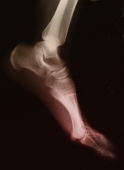
THURSDAY, March 5, 2015 (HealthDay News) — The painful and often debilitating arthritic condition known as gout may offer patients an unexpected bonus: a lower risk for Alzheimer’s disease.
A new study finds that gout — or the high uric acid level that drives the inflammatory condition — may shield against the dementia.
“Our work shows the potential protective effect of a high level of uric acid and gout against the development of Alzheimer’s disease,” said Dr. Hyon Choi, a professor of medicine in the division of rheumatology, allergy and immunology at the Massachusetts General Hospital and Harvard Medical School in Boston.
The study comes after prior research that had suggested that people with gout might also have a lower risk for other neurodegenerative conditions such as Parkinson’s disease.
Still, the study can’t prove cause-and-effect, and “this is just an initial finding,” Choi added. “One paper doesn’t make science.”
His team published their findings online March 4 in the Annals of the Rheumatic Diseases.
According to the U.S. Centers for Disease Control and Prevention, gout is the most common form of inflammatory arthritis, affecting more than 8 million Americans. It is caused by a buildup of uric acid crystals in tissues that can trigger painful flare-ups in the joints, especially the legs and feet.
In the new study, Choi’s group looked at a database involving the medical records of 3.7 million British patients over the age of 40, tracked between 1995 and 2013.
The investigators looked specifically at two groups: more than 59,000 gout patients and nearly 239,000 gout-free patients.
According to the researchers, more than 1,900 of the gout-free patients developed Alzheimer’s disease, compared to only about 300 gout patients.
After accounting for factors such as age, gender, obesity levels, heart health history and socio-economic status, Choi’s team found that people with gout had a 24 percent lower risk of developing Alzheimer’s disease.
But wouldn’t treating gout and easing its symptoms eliminate the anti-Alzheimer’s benefit? Choi said that’s unlikely.
“By the time a gout patient starts taking anything to lower his [uric acid] levels, a lifelong exposure to elevated uric acid has already occurred,” he said. “So the future impact on Alzheimer’s risk is likely to be irrelevant.”
What is it about gout and uric acid that lowers Alzheimer’s risk? Choi said that at this point he can only theorize.
“The primary speculation is that uric acid is an effective scavenger of oxidative stress materials, which can be destructive in cells,” he said. “So it could be the anti-oxidative property of uric acid that plays a role.”
But Dr. John Hardin, a professor of medicine, microbiology and immunology at the Albert Einstein College of Medicine in New York City, has a different theory.
He said that “the body already has a huge number of mechanisms to protect us from oxidative injury,” so the role of uric acid in that area is probably small.
Instead, Hardin puts more stock in the notion that a genetic predisposition towards developing gout may come in tandem with a genetic predisposition towards not developing Alzheimer’s.
“There is a genetic component to gout and also for at least some types of Alzheimer’s,” Hardin said. “So it could simply be that if you inherit gout genes, you don’t get Alzheimer’s genes. There are plenty of examples of this type of thing — [for example,] sickle cell disease makes you resistant to malaria.”
As for Choi, he stressed that more study is needed. “We will still need more research to confirm our finding concerning Alzheimer’s, before we can consider the connection solid and useful,” he said.
More information
There’s more on gout at the U.S. National Institute of Arthritis and Musculoskeletal and Skin Diseases.
Copyright © 2024 HealthDay. All rights reserved.

